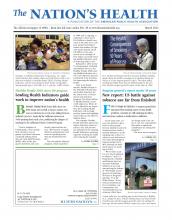Teens with a history of depression are more likely to smoke and lead sedentary lives, putting them at greater risk for cardiovascular disease in the future, according to a recent study.
The study, published online Jan. 26 in Psychosomatic Medicine, looked at three groups of Hungarian teens: adolescents with childhood-onset depression, their siblings who were not depressed and a control group that had no psychiatric disorders.
Because there is already research linking cardiovascular disease and its risk factors to depression in adults, researchers wanted to see if there were links to childhood depression and risks for cardiovascular disease in the teen years, said study author Jonathan Rottenberg, PhD, an associate professor at the University of South Florida’s Department of Psychology.
The teens answered questions, such as how much aerobic exercise they got or if they smoked. Their parents also answered survey questions that looked for the signs or risk factors for cardiovascular disease, such as whether they had been diagnosed with heart disease or diabetes.
When asked if they never smoked, occasionally smoked or smoked regularly, 33.5 percent of teens with a history of depression said they regularly smoked, compared to 13.6 percent of their siblings and 2.5 percent of the control group. The teens with a history of depression were also more likely to be overweight and obese compared to their siblings and the control group.
Cardiovascular disease history was also higher among parents of depressed children and their siblings, compared to the parents of the teens in the control group.
“I think the study is a first step in showing, along with other research, that depression is part of a set of risk factors for cardiovascular disease in adulthood that gets set up relatively early in life,” Rottenberg told The Nation’s Health. “Showing this connection early in life suggests a lot of value in intervening much earlier and before cardiovascular disease is up and running.”
Although depression is associated with sedentary behavior and smoking, Rottenberg said they are risk factors that could be modified by engaging teens in exercise or anti-smoking programs.
Treating depression in childhood, even before adolescence, could be a way to reduce the incidence of cardiovascular disease in adulthood, said Rottenberg, who is also an author of a book on the evolutionary origins of depression.
“Part of why no one has evaluated that is it would require a large study and a large follow-up period,” Rottenberg said. “But the potential benefits to public health are so great that I would think that kind of trial would be a high priority.”
For more information, visit www.psychosomaticmedicine.org/content/early/2014/01/15/PSY.0000000000000028.abstract.
- Copyright The Nation’s Health, American Public Health Association









